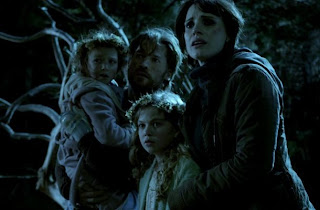The unbreakable bond between mother and child is a theme of horror cinema almost as old as the genre itself: think of Mia Farrow’s twisted, unconditional love for her newborn baby boy, the spawn of Satan, in Roman Polanski’s “Rosemary’s Baby;” how about Ellen Burstyn’s exhaustive commitment to curing her demonically possessed teen daughter in William Friedkin’s “The Exorcist;" and then there’s Rebecca De Mornay as a crazed, vengeful nanny in Curtis Hanson’s “The Hand That Rocks the Cradle,” iconic for a brilliantly disturbing scene in which De Mornay is caught breastfeeding the family’s newborn.
It is a theme that boldly returns in the aptly titled supernatural horror “Mama,” this time with an adoptive twist — here we have a meditation on assumed maternal instinct, specifically that of a young woman for two children that are biologically not hers, as explored through the ever-enjoyable medium of an old-school ghost story. Megan Charpentier and Isabelle Nélisse are Victoria (3) and Lily (1), sisters who are abandonded in the woods when their father, under crippling financial pressure, goes mad and embarks on a killing spree. Found five years later, they are sent to live in the suburbs with their uncle and his longtime girlfriend, still feral from life in the wilderness and no longer accustomed to suburban living.
Turns out they may not have come alone: Mama, an unidentified entity they claim has been nurturing them for the past five years, seems to be paying them visits late at night. Doctors say Mama is a figment of the girls’ troubled imagination, but aunt Annabel (Jessica Chastain, “Zero Dark Thirty”) is convinced otherwise: she hears voices through the air duct, suffers unusually vivid nightmares and senses something watching her inside the house. The film itself, it decidedly wields little ambiguity as to the existence of Mama: this sinister home invader is all too real and has come to take Victoria and Lily back to the woods.
Mama is an intriguing movie monster, characterised not as a mindless killing machine like Jason Voorhees or Michael Myers, instead as a tragic-but-violent fairy tale figure capable of rational thought and granted a clear, ruthless and relatable motivation: to be a mother once again. It’s a pity, then, that although her ghostly presence inspires chills and occasional sympathy, she’s often presented on-screen as a computer-generated special effect and reduced to a squealing ghoul who leaps unexpectedly out from the shadows, withered arms flailing and face hideously distorted — though they pack a sufficient jolt, the jump scares feel cheap.
As haunted sisters Victoria and Lily, Charpentier and Nélisse are a great find, capable of performing the well-worn creepy-child archetype without cliché — there’s surprising subtlety on display from these fresh-faced young talents. But the film ultimately belongs to Chastain, who, fashioned as a punk rock chick with short black locks, is almost unrecognisable from her Oscar-nominated turn as a cold and stoic CIA agent in Kathryn Bigelow’s “Zero Dark Thirty.” It is her character’s transformation, executed with growing warmth and unblinking class by Chastain, that lends the film’s title an intriguing ambiguity — is “Mama” in reference to the eponymous villainess or the heroine, whose bond with Victoria and Lily strips her of her past irresponsibility and, through thick and through thin, helps her discover her inner mom?
Either way, Argentian director Andres Muschietti’s debut feature — an extension of his three-minute short from 2008 — is an effective, bone-rattling haunted house chiller that draws heavily, and lovingly, from genre entries of the past. As a presentation of Guillermo del Toro, credited as an executive producer, it falls short of the poignant, antiquated greatness of “The Orphanage,” more on a par with the efficient spookiness of “Don’t Be Afraid of the Dark.” Along with last year’s hair-raising “The Woman in Black” (coincidentally also featuring a malevolent ghost mother), it shows that trashy, blood-soaked mutilations are not necessary in the art of frightening an audience: all that’s needed is an atmosphere capable of chilling you to the bone.
6/10



No comments:
Post a Comment